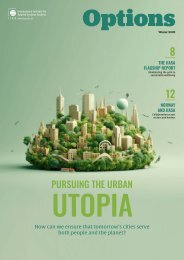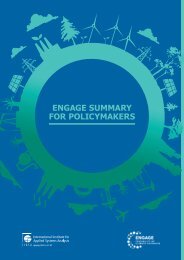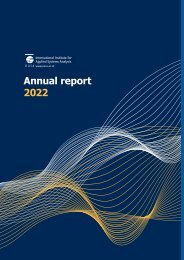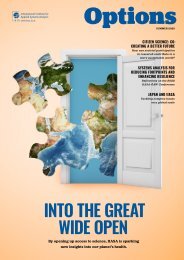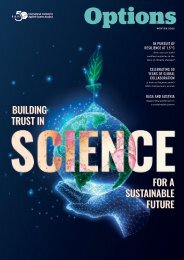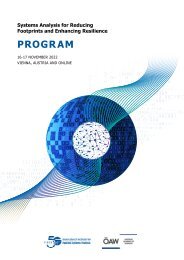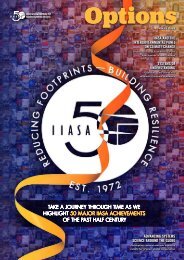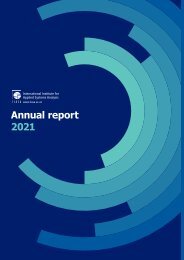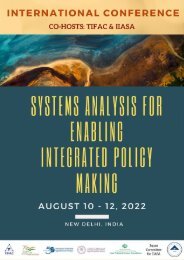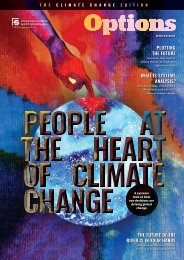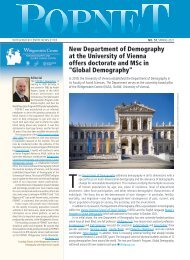Speakers Brochure | IIASA/OeAW Conference
Speakers Brochure for IIASA-OeAW Conference "Systems Analysis for Reducing Footprints and Enhancing Resilience" on 16-17 November 2022.
Speakers Brochure for IIASA-OeAW Conference "Systems Analysis for Reducing Footprints and Enhancing Resilience" on 16-17 November 2022.
Create successful ePaper yourself
Turn your PDF publications into a flip-book with our unique Google optimized e-Paper software.
Systems Analysis for Reducing<br />
Footprints and Enhancing<br />
Resilience<br />
SPEAKERS BROCHURE<br />
16-17 NOVEMBER 2022<br />
VIENNA, AUSTRIA AND ONLINE
SPEAKERS<br />
4 Arun Agrawal<br />
5 Floor Alkemade<br />
6 Chris Brunsdon<br />
7 Elina Brutschin<br />
8 Michael Clegg<br />
9 Sibel Eker<br />
10 Amin Elshorbagy<br />
11 Heinz Fassmann<br />
12 Brian D. Fath<br />
13 Wolfgang Fengler<br />
14 Settimio Ferlisi<br />
15 Marina Fischer-Kowalski<br />
16 Dan Fiscus<br />
17 Matteo Fontana<br />
18 Nicklas Forsell<br />
19 Dilek Fraisl<br />
20 Steffen Fritz<br />
21 Alexia Fuernkranz-Prskawetz<br />
22 Jim Hall<br />
23 Albert S. van Jaarsveld<br />
24 Valeria Javalera-Rincon<br />
25 Pavel Kabat<br />
26 Taher Kahil<br />
27 Katia Karousakis<br />
28 Harald Katzmair<br />
29 Lea Kauppi<br />
30 Christian Koeberl<br />
31 Alexander Lebjedev<br />
32 Hans Liljenstroem<br />
33 Joanne Linnerooth-Bayer<br />
34 Wolfgang Lutz<br />
35 Raimund Mair<br />
36 Gerald Midgley<br />
37 Corinna Milborn<br />
38 Jan Marco Mueller<br />
39 Adil Najam<br />
40 Margit Noll<br />
41 Martin Nowak<br />
42 Helga Nowotny<br />
43 May-Britt Ohman<br />
44 Amanda Palazzo<br />
45 Martin Polaschek<br />
46 Belinda Reyers<br />
47 Keywan Riahi<br />
48 Claudia Ringler<br />
49 Elena Rovenskaya<br />
50 Ursula Scharler<br />
51 Thomas Schinko<br />
52 Linda See<br />
53 Till Spranger<br />
54 Sigrid Stagl<br />
55 Gerhard Svolba<br />
56 Maria Uhle<br />
57 Eeva Vilkkumaa<br />
58 Fabian Wagner<br />
59 Peter T. Warren, CBE<br />
60 Barbara Willaarts<br />
61 Wilfried Winiwarter
Arun Agrawal<br />
Professor, School for Environment and<br />
Sustainability, University of Michigan, USA<br />
Short Biography<br />
Arun Agrawal is Samuel Trask Dana Professor of Governance and Sustainability at the<br />
School for Environment and Sustainability, affiliated faculty at the Gerald R. Ford School<br />
of Public Policy, and Faculty Associate at the Center for Political Studies at the<br />
University of Michigan.<br />
His research and teaching emphasize the politics of international development,<br />
institutional change, conservation, and sustainability. He has conducted research in<br />
more than 20 countries in the tropical world, and his papers have appeared in Science,<br />
PNAS, Conservation Biology, Development and Change, and various Nature journals.<br />
Preceding his work at U-M, Agrawal was educated at Duke University, the Indian<br />
Institute of Management, and Delhi University and has held teaching or research<br />
positions at Yale, Florida, McGill, Berkeley, and Harvard among other universities.<br />
Agrawal is also the author of “Greener Pastures” and “Environmentality.” He serves on<br />
the Editorial Board for Ecology and Society and PNAS. Agrawal was elected to the<br />
National Academy of Sciences in 2018.<br />
Floor Alkemade<br />
Chair Technology, Innovation and Society Group,<br />
Eindhoven University of Technology,<br />
The Netherlands<br />
Short Biography<br />
Floor Alkemade is full professor of Economics and Governance of Technological<br />
Innovation at Eindhoven University of Technology. She received an ERC Consolidator<br />
grant (2022), a Vidi grant (2014) and a Veni grant (2008) to work on research projects<br />
on innovation for sustainability. Previously she was affiliated with the Copernicus<br />
Institute of Sustainable Development at Utrecht University and the Dutch National<br />
Centre for Mathematics and Computer Science (CWI).<br />
Floor Alkemade received her PhD in Agent Based Evolutionary Economics, from TU/e in<br />
2004. She holds an MSc in Artificial Intelligence from VU University Amsterdam. Floor is<br />
associate editor of the Journal of Environmental Innovation and Societal Transitions. In<br />
2015 she joined the Technological, Innovation and Society group at TU/e. Floor uses<br />
data-driven and social simulation approaches to analyse innovation for sustainability at<br />
different scales. Her recent ERC project FAST: Fostering Social Tipping dynamics to<br />
Accelerate Energy Transitions, aims to capture social feedbacks and interactions in<br />
transition models.
Chris Brunsdon<br />
Professor, Geocomputation, National University of<br />
Ireland, Maynooth, Ireland<br />
Short Biography<br />
Chris Brunsdon is Professor of Geocomputation at the National University of Ireland,<br />
Maynooth. Prior to that, he was Professor of Human Geography at the University of<br />
Liverpool.<br />
He has research interests in developing spatial data analysis methods, and<br />
reproducibility and inference for these methods. He was one of the developers of the<br />
technique known as Geographically Weighted Regression (GWR), and has authored a<br />
number of books on using the R statistical programming language. He was recently<br />
involved in advising the Irish government on modelling the COVID-19 pandemic.<br />
Elina Brutschin<br />
Research Scholar, Energy, Climate, and<br />
Environment Program, International Institute for<br />
Applied Systems Analysis (<strong>IIASA</strong>)<br />
Short Biography<br />
Elina Brutschin joined <strong>IIASA</strong> as a research scholar in 2019, and works with the <strong>IIASA</strong><br />
Energy, Climate, and Environment (ECE) Program, with a research focus on bridging<br />
insights from the political economy and modelling studies of energy.<br />
In her most recent line of work, she has focused on developing tools to evaluate<br />
ambitious climate scenarios from different perspectives using interdisciplinary insights.<br />
Her work on feasibility evaluation of scenarios was included in the recent AR6 IPCC<br />
WGIII assessment. The insights from the feasibility evaluations are now used to<br />
develop a new generation of scenarios within the ENGAGE project that would take<br />
different feasibility risks into account.<br />
Elina is interested in further development of approaches that bring in insights from<br />
other disciplines into the Integrated Assessment Models through new narratives and<br />
adjustments of existing assumptions.<br />
6 7
Michael Clegg<br />
Council Chair, International Institute for Applied<br />
Systems Analysis (<strong>IIASA</strong>)<br />
Sibel Eker<br />
Assistant Professor, System Dynamics, Radboud<br />
University, The Netherlands<br />
Short Biography<br />
Michael T. Clegg, served on the faculty of four US universities over a 42 year period<br />
and was most recently Donald Bren Professor of Biological Sciences at the University of<br />
California, Irvine. In the 1990s, Clegg served as dean of the College of Natural &<br />
Agricultural Sciences at UC Riverside and he funded the Genomics Institute at that<br />
Institution. Clegg is a Member of the US National Academy of Sciences, the American<br />
Academy of Arts and Sciences and the American Philosophical Society. He is a Fellow of<br />
the World Academy of Sciences (TWAS) and a corresponding Member of several<br />
academies in Latin America and Africa.<br />
Clegg has an extensive international service record, including 12 years as Foreign<br />
Secretary of the US National Academy of Sciences and four years Vice President<br />
(External) of the International Council of Science (ICSU). He also served for six years<br />
as the Co-Chair of the InterAmerican Network of Academies of Science (IANAS) and as<br />
the first Treasurer of the InterAcademy Partnership (IAP). He is currently Chair of the<br />
Council of the International Institute for Applied Systems Analysis.<br />
Short Biography<br />
Dr. Sibel Eker is an Assistant Professor of System Dynamics at Radboud University,<br />
Nijmegen School of Management and a Research Scholar at International Institute for<br />
Applied Systems Analysis (<strong>IIASA</strong>) in Austria.<br />
Her interdisciplinary research profile combines systems analysis and engineering,<br />
decision sciences and social sciences, and her work brings systems thinking and<br />
uncertainty focus to climate change and sustainability problems with model-based<br />
approaches. Her current research interests center around the drivers and implications<br />
of demand-side climate change mitigation, and co-production of mitigation and<br />
sustainability scenarios through simple integrated assessment models.<br />
Clegg’s research specialty is population genetics and molecular evolution where he has<br />
published extensively. His most notable work was on the dynamics of linked systems of<br />
genes in plans and Drosophila, on the molecular evolution of the plant chloroplast<br />
genome and on using molecular tools to trace the domestication history of barley and<br />
avocado.<br />
8 9
Amin Elshorbagy<br />
Professor, Hydrology and Water Resources<br />
Engineering, University of Saskatchewan, Canada<br />
Short Biography<br />
The research and expertise of Dr. Elshorbagy are focused on, and link, the areas of<br />
hydrologic and water resources systems modelling and decision analysis to support the<br />
decision-making process. He also works extensively on integrated water resources<br />
management of transboundary rivers, attempting to address the challenges of<br />
sustainable utilization of water resources in light of the past hydroclimatic conditions as<br />
well as possible future changes. Water-energy-food nexus is an emerging, central<br />
theme of Elshorbagy’s current research as the second-generation approach of<br />
managing integrated resources, including water.<br />
Dr. Elshorbagy has been an Associate Editor of the prestigious AGU’s Water Resources<br />
Research Journal for nine years and served as Editor of the Journal of<br />
Hydroinformatics. He served as a referee for scientific grants submitted to NOAA,<br />
NSERC, MITACS, Chile Research Fund, NSERC research chair positions, and for several<br />
tenure and promotion cases of professors at Canadian, American, and Middle Eastern<br />
Universities.<br />
Dr. Elshorbagy is a well cited scholar and published over 150 publications in<br />
international journals and conferences and supervised/advised over 70 Masters,<br />
Doctoral, and Postdoctoral researchers. He worked on research projects for municipal<br />
and provincial governments, and secured funding from all levels of government in<br />
Canada, and industry.<br />
Heinz Fassmann<br />
President, Austrian Academy of Sciences (<strong>OeAW</strong>)<br />
Short Biography<br />
Faßmann concluded his studies in Geography and Economic and Social History at the<br />
University of Vienna with a PhD in social history and a habilitation in Human Geography<br />
and Spatial Planning. In 1992 he became the director of the Institute of City and<br />
Regional Research of the Austrian Academy of Sciences. After being appointed<br />
Professor of Applied Geography (Geo-Informatics) at the Technical University Munich in<br />
1996 and a Professor for Applied Geography, Spatial Research and Regional Planning at<br />
the University of Vienna in 2000, he was nominated the Dean of the Faculty of<br />
Geosciences, Geography and Astronomy of the University of Vienna in 2006.<br />
In 2011 he became the Vice-Rector of Human Resources and International Relations<br />
and in 2015 the Vice-Rector for Research and International Affairs of the University of<br />
Vienna. He has served as Austrian Federal Minister of Education, Science and Research<br />
since January 2020 to December 2021 and served in the same capacity from December<br />
2017 to June 2019.<br />
Faßmann was the Chair of the Expert Council for Integration at the Austrian Ministry<br />
for Europe, Integration and Foreign Affairs, a founding member of the Expert Council<br />
of German Foundations for Integration and Migration in Berlin and member of the<br />
Commission on Migration of the Austrian Ministry of the Interior. He is a permanent<br />
member of the Austrian Academy of Sciences and the Academia Europaea and his<br />
achievements have been recognized with a number of awards.<br />
10 11
Brian D. Fath<br />
Senior Research Scholar, Advancing Systems<br />
Analysis Program, International Institute for<br />
Applied Systems Analysis (<strong>IIASA</strong>)<br />
Wolfgang<br />
Fengler<br />
CEO & Founder, World Data Lab<br />
Short Biography<br />
Brian D. Fath is a Professor in the Department of Biological Sciences at Towson<br />
University (Maryland, USA) teaching courses on Ecosystem Ecology, Environmental<br />
Science, and Human Ecology. He is also a Senior Research Scholar at the International<br />
Institute for Applied Systems Analysis (Laxenburg, Austria) and since 2011, the<br />
Scientific Coordinator of <strong>IIASA</strong> Young Scientists Summer Program.<br />
He has published over 200 research papers, reports, and book chapters on<br />
environmental systems modeling, specifically in the areas of network analysis, urban<br />
metabolism, and sustainability. He co-authored, among others, the books A New<br />
Ecology: Systems Perspective (2020), Foundations for Sustainability: A Coherent<br />
Framework of Life–Environment Relations (2019), and Flourishing within Limits to<br />
Growth: Following Nature’s Way (2015). He served as Editor for 6-volume Handbook of<br />
Environmental Management (2020) and 4-volume Encyclopedia of Ecology (2019).<br />
Short Biography<br />
Dr. Wolfgang Fengler is the Founder and CEO of World Data Lab.<br />
At TEDxVienna in November 2014, Wolfgang launched his first data<br />
machine population.io, which he developed together with a core team, including Samir<br />
KC from <strong>IIASA</strong>. Population.io was also endorsed by Bill Gates.<br />
Aftershock (2020) featured him as one of the world’s 100 leading futurists and the<br />
German weekly DER SPIEGEL called him a “big data virtuoso”. Before WDL, Wolfgang<br />
spent over 20 years at the World Bank in senior positions.<br />
Dr. Fath is also Editor-in-Chief for the journal Frontiers in Sustainable Resource<br />
Management and past Editor in Chief of Ecological Modelling (2009 – 2020). He was<br />
the 2016 recipient of the Prigogine Medal for outstanding work in systems ecology and<br />
twice a Fulbright Distinguished Chair (Parthenope University, Naples, Italy, in 2012 and<br />
Masaryk University, Czech Republic, in 2019).<br />
12 13
Settimio Ferlisi<br />
Professor, Geotechnical Engineering, University of<br />
Salerno, Italy<br />
Short Biography<br />
Settimio Ferlisi is Full Professor of Geotechnical Engineering at the University of Salerno<br />
– UNISA (Italy) where he currently teaches “Geotechnics” and “Foundations”,<br />
respectively offered in the master’s degree in Building Engineering-Architecture and in<br />
the master’s degree in Civil Engineering.<br />
In the scientific field, the main topics addressed deal with the analysis of the<br />
mechanical response of saturated structurally-complex porous media, the behavior of<br />
shallow foundations and leaning towers, the risk to life induced by rockfalls and<br />
hyperconcentrated flows, the vulnerability of buildings in subsidence- and slow-moving<br />
landslide-affected areas at different scales.<br />
In addition to his publications, the results of the scientific activity are testified by the<br />
participation in the Center of Excellence on the Hydrogeological Risk of UNISA, in three<br />
projects of relevant national interest (on one occasion as scientific head of research<br />
unit) and in an EU-funded research project.<br />
He is currently the Director of the Geotechnical Laboratory of the Department of Civil<br />
Engineering of UNISA and the President of the International School on “LAndslide Risk<br />
Assessment and Mitigation” (LARAM).<br />
Marina Fischer-<br />
Kowalski<br />
Professor Emeritus, Institute for Social Ecology,<br />
University of Natural Resources and Life Sciences,<br />
Austria<br />
Short Biography<br />
With a Ph.D. in sociology, Dr. Fischer-Kowalski was discontent with the Social Sciences<br />
disregard for Nature as well as natural scientists’ common disregard for society. In the<br />
late 1980s, an interdisciplinary faculty offered her the opportunity to found, and for<br />
many years, direct the Institute for Social Ecology in Vienna, Austria, and build up a<br />
staff of social and natural scientists, with whom she developed the paradigm of social<br />
metabolism and colonization of nature.<br />
This interdisciplinary strand proved successful and paved Dr. Fischer-Kowalski’s way to<br />
becoming, inter alia, professor for Social Ecology at Klagenfurt University and later<br />
BOKU, President of the International Society for Industrial Ecology, Chair of the<br />
Scientific Advisory Board of the Potsdam Institute of Climate Impact Research (PIK),<br />
and President of the International Society for Ecological Economics.<br />
As expert member of UN’s International Resource Panel, she introduced the socioeconomic<br />
metabolism perspective there, became lead author to several of its<br />
publications, and establish the metrics of social metabolism (MEFA: material and<br />
energy flow accounting) as common statistics at Eurostat and on the UN level at SEEA.<br />
This metrics allows to describe societies’ economic performance in biophysical terms.<br />
14 15
Dan Fiscus<br />
R&D Scientist, Berkeley Springs Instruments, USA<br />
Short Biography<br />
Dan is R&D scientist with Berkeley Springs<br />
Instruments and ecologist with the Research Alliance for Regenerative Economics<br />
(RARE). He works, lives, and grew up in the Appalachian region of Western Maryland.<br />
Dan published articles in soil ecology, ecosystem ecology, theoretical ecology,<br />
sustainability, and regenerative economics. He co-authored two books in sustainability<br />
science, including Foundations for Sustainability: A Coherent Framework of Life–<br />
Environment Relations (2018) with Brian Fath.<br />
He was assistant professor at Frostburg State University (FSU, 2007-2012), with<br />
teaching and research in forest ecology and sustainability. As Sustainability Liaison with<br />
FSU (2012-2016), he led creation of the President’s Advisory Council for Sustainability<br />
and advised students who created the Student Sustainability Fee. He co-founded the<br />
Western Maryland Food Council (WMFC, 2015) and served as Council Coordinator<br />
(2019 -2020). With WMFC, he helped convene partners collaborating for food system<br />
change. Dan’s current work focuses on R&D for new applications of ultrasonic sensors.<br />
He also works on change in science to facilitate solutions of the chronic, systemic<br />
global ecological multi-crisis. This work is at the RARE website: https://rare-sci.net/<br />
article/<br />
Matteo Fontana<br />
Project Officer, Joint Research Centre, European<br />
Commission<br />
Short Biography<br />
Matteo Fontana is a Project Officer at the Joint Research Centre of the European<br />
Commission, where is part of the Centre of Advanced Studies project “Computational<br />
Social Science for Policy”. From 2019 to 2021 he has been a Postdoctoral Researcher at<br />
the Modelling and Scientific Computing Lab of Politecnico di Milano, where he was<br />
involved in the development of an early warning system for geo-hazards in<br />
collaboration with the Italian Space Agency.<br />
He holds a PhD in Management Engineering from Politecnico di Milano, where he<br />
studied the application of novel statistical learning methodology to climate change<br />
economics research.<br />
His primary scientific aim is to explore and demonstrate how innovative data sources<br />
and advanced modelling techniques can advise the policymaking of governments and<br />
international organisations. He is a statistician/data scientist by training, he is mainly<br />
interested in applications of data science in economics, demography and migration<br />
studies. His main theoretical interests lie in the realm of nonparametric statistics<br />
(namely hypothesis testing and forecasting), as well as in the modelling of complex<br />
data objects.<br />
For fun, Dan plays ultimate Frisbee and soccer (football), enjoys hiking, music, poetry,<br />
composting, and loves time with wife, Tracy, family, children, and grandchildren.<br />
16 17
Nicklas Forsell<br />
Senior Research Scholar, Biodiversity and Natural<br />
Resources Program, International Institute for<br />
Applied Systems Analysis (<strong>IIASA</strong>)<br />
Dilek Fraisl<br />
Research Scholar, Advancing Systems Analysis<br />
Program, International Institute for Applied<br />
Systems Analysis (<strong>IIASA</strong>)<br />
Short Biography<br />
Nicklas Forsell joined the Ecosystems Services and Management (ESM) Program in<br />
2012 as a postdoctoral research scholar on a scholarship given by <strong>IIASA</strong>. His current<br />
research interests include the use of optimization models to analyze the links between<br />
forest, agricultural, and energy planning. By mean of enhancing and linking large-scale<br />
assessment models, his research focus on developing integrated assessments of<br />
national and global policies.<br />
Dr. Forsell obtained his MSc degree in mathematics from Mid Sweden University and<br />
his PhD in economics from the Swedish University of Agricultural Science (SLU) in<br />
collaboration with the French National Institute for Agricultural Research (INRA). Within<br />
his PhD thesis, he considered long-term forest management under risk and uncertainty.<br />
By means of mathematical programming models, he analyzed the implications of<br />
considering stochastic damage events and spatial dependencies between forest stands<br />
when optimizing management policies of large-scale forest estates. Prior to joining<br />
<strong>IIASA</strong>, Dr. Forsell worked at MINES ParisTech, France, where he focused on long-term<br />
energy system analysis and particularly focused on the integration of bioenergy<br />
production into national and global energy system models.<br />
Short Biography<br />
Dilek Fraisl is a research scholar in the Novel Data Ecosystems for Sustainability<br />
(NODES) Research Group of the <strong>IIASA</strong> Advancing Systems Analysis Program. She has a<br />
PhD in Sustainability Transitions from the University of Natural Resources and Life<br />
Sciences Vienna (BOKU) in Austria.<br />
Fraisl’s research interests are sustainable development, data and statistics, Earth<br />
Observation, and citizen science as theory, practice, and evidence-base for policy<br />
development. She has worked in the areas of data governance and data management,<br />
including research on citizen science data quality. She has led and contributed to<br />
citizen science projects related to marine litter, land use and land cover, as well as<br />
other environmental issues funded by the European Commission, UN agencies, and<br />
other donors.<br />
Fraisl has published scientific papers in areas of sustainable development, data and<br />
statistics, citizen science, and Earth Observations, and also contributed to several UN<br />
reports such as Measuring Progress: Environment and SDGs and Understanding the<br />
State of the Ocean: A Global Manual on Measuring SDG 14.1.1, SDG 14.2.1 and SDG<br />
14.5.1 by the United Nations Environment Programme (UNEP).<br />
She has several board memberships with scientific communities, the UN, and other<br />
global initiatives, including the UN Sustainable Development Solutions Network<br />
Thematic Research Network on Data and Statistics (SDSN TReNDS), the UN Framework<br />
Convention on Climate Change (UNFCCC) Resilience Frontiers, the Group on Earth<br />
Observations (GEO), and the Citizen Science Global Partnership (GCSP), among others.<br />
She is also involved in the organizing committees and scientific advisory boards of<br />
several European and global conferences including the UN World Data Forum.<br />
18 19
Steffen Fritz<br />
Strategic Initiatives Program Director,<br />
International Institute for Applied Systems Analysis<br />
(<strong>IIASA</strong>)<br />
Short Biography<br />
Steffen Fritz is the <strong>IIASA</strong> Strategic Initiatives Program Director and a researcher in the<br />
Novel Data Ecosystems Research Group of the Advancing Systems Analysis Program.<br />
He holds a Master of Science degree in Geographical Information for Development<br />
from the University of Durham, UK, and a PhD from the University of Leeds, UK. After<br />
spending time as a researcher at the Joint Research Centre (JRC) in Ispra, Italy, Fritz<br />
joined <strong>IIASA</strong> as a research scholar, where he has since become the initiator and driving<br />
force behind Geo-Wiki.org and several other projects.<br />
He was the principal investigator of the European Research Council (ERC) funded<br />
CrowdLand Consolidator Grant and the European Union’s Horizon 2020 Framework<br />
Programme for Research and Innovation funded LandSense and WeObserve projects.<br />
He is currently leading the development of the new Picture Pile Platform, which is<br />
funded by an ERC Proof of Concept Grant. In the various capacities he acted in since<br />
2009, including coordinator, principal investigator, work package, or task leader, Fritz<br />
has been responsible for a diverse range of tasks and an overall budget of<br />
approximately EUR 4.2 million. He has more than 160 peer-reviewed publications and<br />
has widely published in high-level journals.<br />
Fritz’s research interests include transformative societal and policy solutions, machine<br />
learning and artificial intelligence, earth observation, citizen science, crowdsourcing,<br />
volunteered geographical information, and citizen generated data. He also has a keen<br />
interest in applications of Earth Observation to food security, land-use science, global<br />
and regional vegetation monitoring, crop yield and crop acreage estimations of<br />
agricultural crops, serious gaming, gamification, in-situ data collection of land use and<br />
land cover data via mobile technologies, and the role of citizen science for the<br />
monitoring and implementation of the Sustainable Development Goals.<br />
Alexia<br />
Fuernkranz-<br />
Prskawetz<br />
Professor in Mathematical Economics, TU Wien<br />
and Deputy Director, Vienna Institute of Demography (VID), Austria<br />
Short Biography<br />
Alexia Fürnkranz-Prskawetz is Professor of Mathematical Economics at TU Wien, deputy<br />
director at the Vienna Institute of Demography, Austrian Academy of Sciences and<br />
research associate at the International Institute of Applied Systems Analysis,<br />
Laxenburg, Austria.<br />
After her study of Technical Mathematics at TU Wien, she attended a postgraduate<br />
study at the University of Chicago in Economics and a postdoctorate at the<br />
Demography Department of the University of California, Berkley. In 1998 she received<br />
the Venia for “Population Economics and Applied Econometrics” at TU Wien. From 1998<br />
to 2003 she was head of an independent research group on “Population, Economy and<br />
Environment” at the MPI for Demography, Rostock.<br />
Her main areas of research are in the economic consequences of population and<br />
individual ageing, long run economic growth and the interrelationship between<br />
population, economy and environment.<br />
She is full member of the Austrian Academy of Sciences, member of Leopoldina<br />
(Nationale Akademie der Wissenschaften) and member of Academia Europaea.<br />
20 21
Jim Hall<br />
Professor, Environmental Change Institute,<br />
University of Oxford, UK<br />
Short Biography<br />
Jim Hall FREng is Professor of Climate and Environmental Risks in the University of<br />
Oxford and Director of Research in the School of Geography and the Environment.<br />
Before joining the University of Oxford in 2011 to become Director of the University’s<br />
Environmental Change Institute, Prof. Hall held academic positions in the Newcastle<br />
University and the University of Bristol.<br />
Prof. Hall is internationally recognised for his research on risk analysis and decision<br />
making under uncertainty for water resource systems, flood and coastal risk<br />
management, infrastructure systems and adaptation to climate change. Prof. Hall is a<br />
member of the Prime Minister’s Council for Science and Technology and is a<br />
Commissioner of the National Infrastructure Commission. He is Chair of the Science<br />
Advisory Committee of the International Institute for Applied Systems Analysis (<strong>IIASA</strong>).<br />
He was a member of the UK independent Committee on Climate Change Adaptation<br />
from 2009 to 2019.<br />
Prof. Hall’s group in the University of Oxford is at the forefront of risk analysis of<br />
climatic extremes and their impacts on infrastructure networks and economic systems,<br />
from local to global scales. He led the development of the National Infrastructure<br />
Systems Model (NISMOD), which was used for the UK’s first National Infrastructure<br />
Assessment and for analysis of the resilience of energy, transport, digital and water<br />
networks in Great Britain. His group developed the first national water resource<br />
systems simulation model for England and Wales. Prof. Hall conceived of, and now<br />
chairs, the UK’s Data and Analytics Facility for National Infrastructure (DAFNI). His<br />
systems analysis methods have been applied worldwide, including in Argentina, China,<br />
Curacao, St Lucia, Tanzania and Vietnam.<br />
Albert S. van<br />
Jaarsveld<br />
Director General, International Institute for<br />
Applied Systems Analysis (<strong>IIASA</strong>)<br />
Short Biography<br />
Albert van Jaarsveld was appointed 11th Director General of the International Institute<br />
for Applied Systems Analysis (<strong>IIASA</strong>) in 2018. Prior to joining <strong>IIASA</strong>, he was Vice-<br />
Chancellor and Principal of the University of KwaZulu-Natal in South Africa, and<br />
President and CEO of the South African National Research Foundation (NRF).<br />
Van Jaarsveld obtained his PhD in Zoology (University of Pretoria), pursued<br />
postdoctoral studies and research in conservation biology and global security in<br />
Australia and the UK, and completed executive management training at Harvard<br />
University. His research work focused on biodiversity, conservation planning,<br />
biodiversity and climate change, and ecosystem services. He was appointed full<br />
professor at both the Universities of Pretoria and Stellenbosch and published more<br />
than 100 primary research papers, including highly cited works in Science and Nature.<br />
Van Jaarsveld served as co-chair of the MEA follow-up: Sub-global assessments,<br />
member of the International Council for Science (ICSU) nominations committee, IPBES<br />
focal point, Chaired the G8 science ministers’ group of senior officials on global<br />
research infrastructure, chair of IGFA, co-Chair of Belmont Forum, member of the ICSU<br />
review panel (2013), IPBES external review panel (2018), Future Earth external review<br />
Panel (2020) and on the ISC Commission on Missions for Sustainability (2021).<br />
He has published four books, including, The Future of National Infrastructure: A<br />
System-of-Systems Approach, which was published by Cambridge University Press in<br />
2016.<br />
22 23
Valeria Javalera-<br />
Rincon<br />
Research Scholar, Advancing Systems Analysis<br />
Program, International Institute for Applied<br />
Systems Analysis (<strong>IIASA</strong>)<br />
Short Biography<br />
Dr. Valeria Javalera holds a Ph.D. (cum laude) in Automatic Control, an MSc. in<br />
Computer Science and an Engineering degree in Computer Systems. She has<br />
participated in several projects in the EU related to distributed Optimization of natural<br />
resources and has more than 15 years of teaching experience in Computer Science. Dr.<br />
Javalera’s main contributions are developing Machine Learning methods to solve multiobjective<br />
and multi-agent optimization problems where a Pareto optimum is needed.<br />
At <strong>IIASA</strong>, Dr. Javalera is the PI of The “Food, Agriculture, Biodiversity, Land-Use, and<br />
bio Energy” (FABLE) project, wherewith her team has developed the Smart Linker<br />
Architecture. In FABLE the Smart Linker Architecture is used to link land-use models<br />
from 24 regions/countries participating in the project. Part of her work in FABLE is to<br />
help coordinate the collaboration between the different country teams to address some<br />
SDGs by aligning countries’ land-use planning through sustainable international trade.<br />
Dr. Javalera is also the PI of the “Land-use planning and financial innovation to<br />
increase Mexico’s resilience to climate change” Project, where <strong>IIASA</strong> contributes to<br />
developing novel participatory Land-use planning tools at different layers to increase<br />
small farmer resilience to Climate Change in vulnerable areas.<br />
Pavel Kabat<br />
Secretary-General, International Human Frontier<br />
Science Program Organization (HFSPO)<br />
Short Biography<br />
Trained as a mathematician and hydrologist, Professor Kabat has worked in the field of<br />
earth system sciences since the early 1980s, with a focus on transdisciplinary<br />
approaches, land-atmosphere interactions, and biogeochemical feedbacks. In July<br />
2020, he was appointed Secretary General of the International Human Frontier Science<br />
Program Organization (HFSPO) after serving as the inaugural Chief Scientist and<br />
Research Director of the Geneva based World Meteorological Organization (WMO) of<br />
the United Nations and as Director General and Chief Executive Officer of the<br />
International Institute for Applied Systems Analysis (<strong>IIASA</strong>) in Laxenburg, Austria.<br />
HFSPO was established in 1989 by the G7 nations and the European Commission to<br />
advance international research at the frontier of the life sciences. It is supported by the<br />
G7 nations, together with the European Commission, Switzerland, Australia, India,<br />
Israel, New Zealand, Singapore, and the Republic of Korea. The HFSP frontier network<br />
includes about 7,500 scientists, among whom 28 HFSPO awardees have gone on to win<br />
the Nobel Prize.<br />
Since late 1990st he has been Professor at Wageningen University in the Netherlands<br />
and is the co-author of around 450 publications and (co)editor of numerous special<br />
issues of peer reviewed international journals.<br />
In 2013, he was named by Her Majesty Queen Beatrix Knight in the Order of the<br />
Netherlands Lion, which recognizes excellence in the arts, science, sport, and<br />
literature. In 2018, he was awarded the Austrian Cross of Honor for Science and Art,<br />
First Class.<br />
24 25
Taher Kahil<br />
Water Security Research Group Leader,<br />
Biodiversity and Natural Resources Program,<br />
International Institute for Applied Systems Analysis<br />
(<strong>IIASA</strong>)<br />
Short Biography<br />
Dr. Taher Kahil is the group leader of the Water Security Research Group at <strong>IIASA</strong>. His<br />
research interests are in the areas of integrated biophysical economic modeling for<br />
basin-scale water policy analysis, the economics of water allocation and water quality,<br />
and evaluation of adaptation policy interventions to global changes in water and<br />
agriculture.<br />
Dr. Kahil leads several international research projects on water-food-energy nexus<br />
management, upscaling of sustainable intensification practices, and assessment of<br />
water security. He has published over 50 publications including peer-reviewed articles,<br />
book chapters, and policy briefs. Dr. Kahil is a topic editor at International Journal of<br />
Environmental Research and Public Health (MDPI), associate editor at Frontiers in<br />
Water (Frontiers) and guest editor for a special issue at Water Economics and Policy<br />
(World Scientific).<br />
Dr. Kahil serves currently as alternate governor and chair of the global change task<br />
force at the World Water Council.<br />
Katia Karousakis<br />
Biodiversity Programme Leader, Organisation for<br />
Economic Co-operation and Development (OECD)<br />
Short Biography<br />
Katia Karousakis works in the Environment Directorate at the Organisation for<br />
Economic Co-operation and Development (OECD), where she leads the Biodiversity,<br />
Land Use and Ecosystems (BLUE) programme. Her work focuses on the economics and<br />
policy of biodiversity, covering areas such as effective design of policy instruments,<br />
biodiversity finance and mainstreaming.<br />
Recent work includes OECD (2021), Biodiversity, Natural Capital and the Economy: A<br />
Policy Guide for Finance, Economic and Environment Ministers, prepared for the UK G7<br />
Presidency; OECD (2019), Biodiversity: Finance and the Economic and Business Case<br />
for Action, prepared for the French G7 Presidency; and OECD (2021), Tracking<br />
Economic Instruments and Finance for Biodiversity 2021.<br />
Katia joined the OECD in 2006 working on climate change issues, with previous<br />
experience working on other environmental issues such as water management, waste<br />
and transport.<br />
An environmental economist by training, Katia has a PhD from UCL, London, and a<br />
Masters’ degree from Duke University, USA.<br />
26 27
Harald Katzmair<br />
Founder & CEO, FASresearch, Austria<br />
Short Biography<br />
Dr. Harald Katzmair, founder and director of the Vienna-based analysis and consulting<br />
company is a leading expert in the field of applied social network analysis with a focus<br />
on power relations, innovation, and strategic situation analysis.<br />
Born in Linz, Harald Katzmair studied sociology and philosophy at the University of<br />
Vienna, completing his PhD in 1996. From 1992 to 2000 he worked as a research<br />
assistant at the Vienna University of Economics and Business Administration. His<br />
lifelong commitment to teaching and public outreach supports and extends his<br />
contributions to applied research consulting.<br />
Since 1992 he has taught at various universities in and around Vienna, including the<br />
University of Vienna, the Vienna University of Economics and Business Administration,<br />
and the University of Applied Arts. He has also been invited to deliver lectures for<br />
faculty seminars and public audiences at Harvard, Oxford, the University of California,<br />
Berkeley, and many other tier-one research institutions worldwide. Over the course of<br />
his career, Dr. Katzmair has published more than 50 research papers in professional<br />
journals and has been involved in over 2000 international projects and has written a<br />
book entitled: The Formula of Power (2011), an analysis of the social and economic<br />
foundations of power.<br />
Lea Kauppi<br />
Council Vice Chair, International Institute for<br />
Applied Systems Analysis (<strong>IIASA</strong>)<br />
Short Biography<br />
Dr. Lea Kauppi has been Director General of the Finnish Environment Institute (SYKE),<br />
a multidisciplinary environmental research institute since 1995 until October 2020.<br />
Lea Kauppi received her PhD from the University of Helsinki in 1984. She was awarded<br />
Honorary Doctorate in Technology at the Aalto University in 2018. Her research focus<br />
has been on agricultural pollution of rivers and lakes, modeling of impacts of<br />
acidification, impacts of climate change as well as management of transboundary<br />
waters. She has a long experience on working at the science –policy interface related<br />
to various environmental issues and was a member of the International Resource Panel<br />
of UNEP in 2008-2016. She has also been frequently asked to serve as evaluator of<br />
research proposals and as a panel member of institutional reviews in several European<br />
countries.<br />
Since 2016 she is a member and since 2018 a Vice Chair of the Council of the<br />
International Institute for Applied Systems Analysis.<br />
As a social scientist, management philosopher and entrepreneur, Harald Katzmair<br />
makes new paths in strategy and decision-making processes visible. With his visionary<br />
understanding of network science and resilience theory he has supported clients from<br />
the private as well as the public sector for over 25 years now.<br />
28 29
Christian Koeberl<br />
Chair, Austrian <strong>IIASA</strong> Committee; <strong>IIASA</strong> Council<br />
Member for Austria, International Institute for<br />
Applied Systems Analysis (<strong>IIASA</strong>)<br />
Alexander<br />
Lebedev<br />
Research Specialist, Karolinska Institutet, Sweden<br />
Short Biography<br />
Christian Koeberl is full professor of geosciences (impact research and planetary<br />
geology) at the University of Vienna, Austria, as well as full member of the Austrian<br />
Academy of Sciences, where he is chair of the Austrian <strong>IIASA</strong> Committee. From 2010<br />
to 2020, he was director general of the Natural History Museum Vienna.<br />
He studied chemistry, physics, and astronomy, obtained his PhD in 1983, and his<br />
“habilitation” in the geosciences in 1990. He had visiting scientist appointments at,<br />
among others, the Lunar and Planetary Institute and NASA Johnson Space Center in<br />
Houston, and the Carnegie Institution in Washington, and was visiting professor at,<br />
e.g., Dartmouth College (New Hampshire) and the University of the Witwatersrand<br />
(South Africa). His research deals mostly with impact craters, especially geochemical,<br />
mineralogical, and petrographic studies, and the early Earth, meteorites, and planetary<br />
geology.<br />
His publication record includes about 500 peer-reviewed scientific papers, many of<br />
which deal with impact craters; asteroid 15963 is named in his honor “Koeberl”. Among<br />
other honors, he received the “Barringer Medal” of the Meteoritical Society for his<br />
impact research.<br />
Short Biography<br />
Alexander is a medical doctor and neuroscientist with over 15 years of experience in<br />
clinical and biomedical research. He received his medical degree from I.P. Pavlov State<br />
Medical University of St. Petersburg with training in psychiatry and completed his PhD<br />
in Norway at the University of Bergen, working with applications of machine learning<br />
and computational neuroimaging in the diagnostics of neurodegenerative diseases. He<br />
then completed two postdocs and assistant professorship at Aging Research Center<br />
and Karolinska Institutet in related areas of biomedical research expanding on<br />
population studies and computational neuroscience of belief formation. He is currently<br />
holding a research specialist at the Department of Clinical Neuroscience at Karolinska<br />
Institutet.<br />
His current academic work is focused on understanding complex relationships between<br />
global societal dynamics and people’s health, wellbeing, beliefs, and decision-making.<br />
As a part of his academic career, he published dozens of peer-reviewed articles on<br />
brain imaging, psychopharmacology and socionomics. Alexander’s mission is to develop<br />
novel wellbeing models that foster individual and societal resilience.<br />
At the session “New Frontiers in Systems Analysis Theories, Methods, and Tools”, he<br />
will be speaking about his studies of social mood and its implications for public health,<br />
clinical research and policy-making.<br />
30 31
Hans<br />
Liljenstroem<br />
Director, Agora for Biosystem, Sweden<br />
Short Biography<br />
Hans Liljenström (born in 1956) received his MSc in Engineering Physics in 1982 and<br />
PhD in Theoretical Physics in 1987 at the Royal Institute of Technology (KTH),<br />
Stockholm, Sweden. He spent a postdoc period at Caltech, 1989-90, developing<br />
neurocomputational models related to perception and learning. In the 1990’ he worked<br />
as an associate professor in Theoretical Biophysics at KTH, and since 2001 is a full<br />
professor in Theoretical Biology and Biophysics at the Dept. of Energy and Technology,<br />
SLU, Sweden.<br />
Liljenström is the founding director of Agora for Biosystems, an international research<br />
centre administered by the Sigtuna Foundation. His research interests include<br />
mathematical modelling of biological systems and processes at the micro, meso, and<br />
macro levels. In particular, complex dynamics, including oscillations and chaos, as well<br />
as the link between neural and mental processes.<br />
His specialty is relating structure, dynamics and function of biological networks. Lately,<br />
his work is focused on computational models of human decision making, with<br />
relevance to societal transformation. He has been co-coordinator (2012-16) of the EU<br />
project COMPLEX on the transition towards a low carbon society. Currently (2019-23),<br />
he is a PI of an international Templeton-Fetzer project on the Neurophilosophy of Free<br />
Will.<br />
Joanne<br />
Linnerooth-<br />
Bayer<br />
Emeritus Research Scholar, Population and Just<br />
Societies Program, International Institute for Applied Systems Analysis (<strong>IIASA</strong>)<br />
Short Biography<br />
Joanne Linnerooth-Bayer focuses on global change with particular interest in the risk of<br />
extreme events, nature-based solutions (NBS) for their mitigation, insurance for<br />
transferring risk, and participatory processes for inclusive stakeholder engagement.<br />
She and her colleagues have designed and tested novel stakeholder co-design<br />
techniques, as well as developed policy options to support risk reduction, risk transfer,<br />
and other forms of pro-active disaster risk management.<br />
Trained in engineering and economics (Carnegie-Mellon University, University of<br />
Maryland), her interdisciplinary work includes understanding multiple perspectives<br />
(plural rationalities) on climate change and other global policy issues, particularly as<br />
they relate to policy interventions that are considered equitable and legitimate.<br />
Linnerooth-Bayer has over 100 journal publications and consultancy reports, including<br />
articles in Nature Climate Change, Science, and PNAS. She is a founding member of<br />
the Munich Climate Insurance Initiative as well as the Austrian Climate Research<br />
Program. She serves on numerous professional committees and editorial boards,<br />
including the IDRiM Journal and the Journal of Economics of Disasters and Climate<br />
Change. She has served as Lead Author and Review Editor on the Intergovernmental<br />
Panel on Climate Change (IPCC) Special Report on Managing the Risks of Extreme<br />
Events (SREX) and the IPCC Fifth Assessment Report, respectively. She is also a<br />
coordinating lead author on the chapter, Pathways to Systemic Risk Governance, of the<br />
United Nations Office for Disaster Risk Reduction (UNDRR) Global Assessment Report<br />
2020.<br />
32 33
Wolfgang Lutz<br />
Interim Deputy Director General for Science,<br />
International Institute for Applied Systems Analysis<br />
(<strong>IIASA</strong>)<br />
Short Biography<br />
Wolfgang Lutz is the Interim Deputy Director General for Science at the International<br />
Institute for Applied Systems Analysis (<strong>IIASA</strong>) and the Founding Director of the<br />
Wittgenstein Centre for Demography and Global Human Capital, a cooperation between<br />
the University of Vienna (where he is Professor at the Department of Demography),<br />
<strong>IIASA</strong> (where he was for 25 years Director of the World Population Program), and the<br />
Austrian Academy of Sciences (where he is a Director of the Vienna Institute of<br />
Demography).<br />
He holds a PhD in Demography from the University of Pennsylvania, USA. Lutz has won<br />
prestigious awards including the Wittgenstein Prize, two European Research Council<br />
(ERC) Advanced Grants, the Mattei Dogan award of the International Union for the<br />
Scientific Study of Population (IUSSP), and the Mindel C. Sheps Award of the<br />
Population Association of America (PAA). He is a member of the Austrian Academy of<br />
Sciences, the German National Academy Leopoldina, the US National Academy of<br />
Sciences (NAS), the World Academy of Sciences (TWAS), the Finnish Society for<br />
Sciences and Letters, and the Academia Europea. He was also appointed by the UN<br />
Secretary-General to be one of the 15 members of the Independent Group of Scientists<br />
to produce the quadrennial Global Sustainable Development Report 2019.<br />
Raimund Mair<br />
Senior Water Resources Management Specialist,<br />
World Bank, Austria<br />
Short Biography<br />
Mr. Raimund Mair joined the World Bank Group Water Global Practice in January 2019.<br />
In his position as Senior Water Resource Management Specialist he is involved in<br />
addressing aspects related to Water Security in countries of the Europe and Central<br />
Asia region, as well as leading the Danube Water Program, which is a technical<br />
assistance program for the water sector in South-East Europe.<br />
In his previous occupations at the European Commission and the International<br />
Commission for the Protection of the Danube River, he was working on the<br />
implementation of the EU Water Framework Directive and transboundary cooperation.<br />
Mr. Mair holds diplomas in Engineering from the University of Natural Resources and<br />
Life Sciences, Vienna and Water Policy from Cranfield University, United Kingdom.<br />
He has published over 280 scientific articles, including 24 in Science, Nature, and<br />
PNAS, and written or edited 27 books and special issues.<br />
34 35
Gerald Midgley<br />
Professor, Systems Thinking, Centre for Systems<br />
Studies, University of Hull, UK<br />
Corinna Milborn<br />
Director of Information, ProSiebenSat.1 PULS 4<br />
Media Group<br />
Short Biography<br />
Gerald Midgley is Professor of Systems Thinking in the Centre for Systems Studies,<br />
Faculty of Business, Law and Politics, University of Hull, UK. He also holds Adjunct<br />
Professorships at Linnaeus University, Sweden; the University of Queensland, Australia;<br />
the University of Canterbury, New Zealand; Mälardalen University, Sweden; and Victoria<br />
University of Wellington, New Zealand. He has held research leadership roles in both<br />
academia and government, having spent eleven years as Director of the Centre for<br />
Systems Studies at Hull, and seven years as a Senior Science Leader in the Institute for<br />
Environmental Science and Research (ESR), New Zealand.<br />
Short Biography<br />
Austrian political scientist and journalist Corinna Milborn is director of information at<br />
ProSieben.Sat1.PULS 4 and host of the PULS 4 News Talk “Pro & Contra”. She also<br />
conducts the political interviews in the station’s current affairs section.<br />
Corinna Milborn deals intensively with the topics of migration, integration, globalization,<br />
and human rights. She sees her job as a vocation and tries to move, change and<br />
improve things in a sustainable way.<br />
Gerald has written over 300 papers for academics and practitioners on systems<br />
thinking and community operational research, and has been involved in a wide variety<br />
of public sector, community development, health service, technology foresight and<br />
resource management projects.<br />
He was the 2013/14 President of the International Society for the Systems Sciences<br />
and has written or edited twelve books. These include: Systemic Intervention:<br />
Philosophy, Methodology, and Practice (Kluwer, 2000); Systems Thinking, Volumes I-IV<br />
(Sage, 2003); Community Operational Research: OR and Systems Thinking for<br />
Community Development (Kluwer, 2004); Forensic DNA Evidence on Trial: Science and<br />
Uncertainty in the Courtroom (Emergent, 2011); and the Routledge Handbook of<br />
Systems Thinking (Routledge, 2023, in press).<br />
36 37
Jan Marco<br />
Mueller<br />
Coordinator Science Diplomacy and Multilateral<br />
Relations, European Commission<br />
Short Biography<br />
Following his PhD in Geography at the University of Marburg (Germany), Jan Marco<br />
Müller’s career included research management positions at the Helmholtz Centre for<br />
Environmental Research (UFZ) in Leipzig, the former JRC Institute for Environment and<br />
Sustainability in Ispra (Italy), and the UK Centre for Ecology & Hydrology near Oxford.<br />
After having served as Assistant to the Director-General of the European Commission’s<br />
Joint Research Centre (2009-2012), he managed the office of the Chief Scientific<br />
Adviser to the President of the European Commission (2012-2015) and then joined DG<br />
Research and Innovation to help setting up the Commission’s current Scientific Advice<br />
Mechanism. 2017-2020 he worked for the International Institute for Applied Systems<br />
Analysis (<strong>IIASA</strong>) near Vienna as Head of the Directorate Office and Acting Chief<br />
Operations Officer. 2020-2022 he served as first ever Science & Technology Advisor of<br />
the European External Action Service (EEAS).<br />
Since June 2022 he coordinates science diplomacy and multilateral relations at the<br />
European Commission’s DG Research and Innovation with the task of developing the<br />
European Science Diplomacy Agenda.<br />
Adil Najam<br />
Professor, Pardee School, Boston University,<br />
USA<br />
Short Biography<br />
Adil Najam is Dean Emeritus at Boston University’s Pardee School of Global Studies.<br />
Earlier he served as Vice Chancellor of the Lahore University of Management Sciences<br />
in Pakistan. He also serves as senior advisor to the Jinnah Centre for Character and<br />
Leadership (Pakistan). He holds a PhD and two Masters from MIT, a Specialization in<br />
Negotiation from the Program on Negotiation at Harvard Law School, and completed<br />
engineering studies at the University of Engineering and Technology in Lahore,<br />
Pakistan. Professor Najam was a convening lead author for the Third and Fourth<br />
Assessments of the Intergovernmental Panel on Climate Change (IPCC). In 2008 he<br />
was invited by the UN Secretary-General to serve on the UN Committee on<br />
Development (CDP).<br />
He is author and editor of nine books and more than 100 scholarly papers on global<br />
environmental policy, sustainable development, human development, and technology<br />
policy. He has served as a Trustee on the international board of WWF and The Asia<br />
Foundation, as Chair of the Luc Hoffmann Institute, and as Board Chair of the South<br />
Asia Network of Development and Environmental Economics (SANDEE).<br />
At <strong>IIASA</strong> he was a YSSP, later a Council member, and currently the Chair of the Friends<br />
of <strong>IIASA</strong>.<br />
Twitter: @JanMarcoScience<br />
38 39
Margit Noll<br />
CEO, European Partnership Driving Urban<br />
Transitions, Austrian Research Promotion Agency<br />
(FFG), Austria<br />
Short Biography<br />
Margit Noll is CEO of the European Partnership Driving Urban Transitions, an<br />
intergovernmental research and innovation programme on sustainable urban<br />
development, financed by 28 European countries and the European Commission. The<br />
DUT partnership is the new programme of the Joint Programming Initiative Urban<br />
Europe which Margit is managing since 2014.<br />
She has more than 20 years of experience in research management and strategy<br />
development in organisations and networks. Among others, she was responsible for<br />
corporate strategy at the Austrian Institute of Technology from 2008 to 2016. In 2016<br />
she joined the Austrian Research Promotion Agency FFG, the Austrian funding agency<br />
for applied research and innovation. Margit has a PhD in physics and a MBA in general<br />
management.<br />
Martin Nowak<br />
Professor, Mathematics and Biology, Harvard<br />
University, USA<br />
Short Biography<br />
Martin Nowak is Professor of Mathematics and of Biology at Harvard University. His<br />
research focuses on evolutionary dynamics which is the study of the fundamental<br />
principles that guide evolutionary change.<br />
Mutation and selection are the classic components of the evolutionary process.<br />
Mutation leads to novelty, and natural selection determines the success of new<br />
mutations. But Martin believes that in order to get organization and the emergence of<br />
ever more complicated structures, evolution needs a third component, and this is<br />
cooperation.<br />
Martin has long studied why cooperation exists and how it evolved—in other words,<br />
the reasons we do things that benefit someone else at cost to ourselves. Over the<br />
years, he has used mathematical descriptions to express the behavior of cells, viruses,<br />
insects, and humans, trying to understand what makes individuals join forces, work<br />
together, and help one another. Based on his mathematical models, as well as<br />
experimental games conducted with people who interact with each other, he has<br />
observed that nice guys can finish first, it is often better to reward than punish, and it<br />
pays to be generous, forgiving, and hopeful. Cooperation is a winning strategy in life.<br />
Martin also uses mathematical models and computer simulations to study the origin of<br />
life, the evolution of social behavior, the evolution of cancer, the dynamics of virus<br />
evolution, and the evolution of language.<br />
40 41
Helga Nowotny<br />
Former President and Founding Member,<br />
European Research Council (ERC)<br />
May-Britt Ohman<br />
Associate Professor, Centre for Multidisciplinary<br />
Studies on Racism, Uppsala University, Sweden<br />
Short Biography<br />
Helga Nowotny is Professor emerita of Science and Technology Studies, ETH Zurich,<br />
founding member and former President of the European Research Council.<br />
She has held teaching and research positions at universities and research institutions in<br />
several countries in Europe and continues to be actively engaged in research and<br />
innovation policy at European and international level. Among other, she is currently<br />
member of the Board of Trustees of the Falling Walls Foundation, Berlin, Vice-President<br />
of the Lindau Nobel Laureate Meetings, a member of the Austrian Council for Research<br />
and Technology Development, Chair of the Scientific Advisory Board of the Complexity<br />
Science Hub, Vienna and was Visiting Professor at Nanyang Technological University,<br />
Singapore. She received multiple honorary doctorates including from the University of<br />
Oxford and the Weizmann Institute of Science in Israel.<br />
She has published widely in science and technology studies, STS, and on social time.<br />
Her latest publication “In AI we Trust. Power, Illusion and Control of Predictive<br />
Algorithms” has been published by Polity Press in 2021 followed by the Italian “Le<br />
macchine di Dio. Gli algoritmi predittivi e l’illusione del controllo”, and Spanish<br />
translation “La fe en la Inteligencia Artificial. Los algoritmos predictivos y el future de la<br />
humanidad”. Other recent publications are, The Cunning of Uncertainty (2015) and An<br />
Orderly Mess (2017).<br />
helga-nowotny.eu<br />
Short Biography<br />
May-Britt Ohman is Associate Professor in Environmental History, PhD in History of<br />
Technology, Lule and Forest Sámi of Lule River/Julevädno, with Tornedalian heritage.<br />
Öhman leads the supradisciplinary research group “Dálkke: Indigenous Climate Change<br />
Studies”, funded within the Swedish National Research Program on Climate Change,<br />
based at the Centre for Multidisciplinary Studies on Racism, CEMFOR, Uppsala<br />
University, and is also guest associate professor at the unit of History, Luleå University<br />
of Technology, LTU.<br />
Ohman’s research and teaching focus is on large technical systems, hydropower, water<br />
resources, energy production/consumption, mines, environment, risk and safety,<br />
decolonisation and healing from colonial traumas, Feminist Technoscience and<br />
Indigenous Methodologies/Theories. Geographical focus is on Sábme, the Arctic and<br />
comparative studies with other Indigenous territories around the world.<br />
Dr. Ohman works through supradisciplinary collaborations to amongst other<br />
• discuss and promote Indigenous as well as Western environmentally friendly<br />
sociotechnical innovations.<br />
• analyze how technical design of energy systems relate to efforts of reduced<br />
consumption and emissions.<br />
• analyze consequences of climate change for Indigenous communities.<br />
• analyze CO 2<br />
emissions, climate change and environmentally negative impact from<br />
technical designs such as wind power, nuclear power, hydropower, solar cells.<br />
• analyze how technical designs claimed to be “green” affect Indigenous<br />
communities already under hard pressure from colonization.<br />
• analyze how more-than-humans, forests, lands and waters are affected by settler<br />
colonial industrial expansions.<br />
• contribute to the establishment of the field Indigenous Climate Change Studies.<br />
42 43
Amanda Palazzo<br />
Research Scholar, Biodiversity and Natural<br />
Resources Program, International Institute for<br />
Applied Systems Analysis (<strong>IIASA</strong>)<br />
Martin Polaschek<br />
Federal Minister for Education, Science and<br />
Research of the Republic of Austria<br />
Short Biography<br />
Short Biography<br />
Amanda Palazzo has been a Research Scholar with the Integrated Biosphere Futures<br />
group since 2012. Her areas of research include the economic modelling of the waterenergy-land<br />
nexus, and she is one of the core developers of the partial-equilibrium<br />
model Global Biosphere Management Model (GLOBIOM). Her work has focused on the<br />
human demand for water resources, food security and agricultural development in the<br />
face of global change from both socioeconomic and climate change.<br />
She has also worked extensively in stakeholder engagement to link qualitative and<br />
quantitative scenarios with modelling tools. She was one of the leaders for the Zambezi<br />
river basin case-study for the Integrated Solutions for Water-Energy and Land (ISWEL)<br />
project funded by <strong>IIASA</strong>, GEF and UNIDO. Her work also includes assessing the<br />
impacts of investments in irrigation infrastructure and the impacts of adopting climatesmart<br />
agriculture strategies.<br />
Martin Polaschek was born in Bruck/Mur in 1965. After studying law, he was awarded<br />
the title of Professor for Austrian and European legal developments, contemporary<br />
legal history, and federalism research in 2000 and was promoted to associate university<br />
professor. From 2003 to 2019, he was Vice Rector for Studies and Teaching and from<br />
October 2019 to December 2021 Rector of the University of Graz. In addition,<br />
Polaschek was spokesman for the Austrian Vice Rectors for Teaching. Martin Polaschek<br />
conducted research with a focus on the areas of post-war justice, university law and<br />
municipal research.<br />
On December 6, 2021, Polaschek was sworn in as Minister of Education, Science and<br />
Research.<br />
Polaschek is married and a father of a family.<br />
Amanda Palazzo is the co-founder and current President of <strong>IIASA</strong>’s Women in Science<br />
Club (WISC). Sher co-coordinates the mentoring program as well as leads outreach<br />
and programming that amplifies the scientific contributions of women and provides an<br />
inclusive platform for members to work together to tackle the challenges facing women<br />
in science.<br />
44 45
Belinda Reyers<br />
Professor, Sustainability Science, University of<br />
Pretoria, South Africa<br />
Short Biography<br />
Belinda Reyers is a Professor of Sustainability Science at the University of Pretoria,<br />
South Africa and a Research Affiliate of the Beijer Institute of Ecological Economics,<br />
Sweden. Prof. Reyers’ work bridges social-ecological systems science and sustainable<br />
development practice with a focus on the dynamics connecting ecosystems, resilience,<br />
and human development. Together with diverse collaborators, she has secured<br />
international grants to develop research and capacity for navigating the complex<br />
challenges of sustainable development. These experiences also directly test and shape<br />
her research.<br />
Between 2004 and 2015, she established and led the Biodiversity and Ecosystem<br />
Services Research Group at the CSIR, South Africa, where she worked as a Chief<br />
Scientist. In 2015 she took up a position as the Director of the Sida-funded Resilience<br />
and Development program at the Stockholm Resilience Centre in Sweden. She returned<br />
to South Africa in 2018 to take up the Research Chair in Sustainability Science at<br />
Future Africa, University of Pretoria.<br />
Her work has been widely published, cited and applied in both research and policy. She<br />
is active on the advisory boards of international scientific organisations and initiatives<br />
including Future Earth, IPBES and recently on the High-Level Advisory Panel for the UN<br />
Special Report on Human Security.<br />
Keywan Riahi<br />
Energy, Climate, and Environment Program<br />
Director, International Institute for Applied Systems<br />
Analysis (<strong>IIASA</strong>)<br />
Short Biography<br />
Keywan Riahi is the Director of the Energy, Climate and Environment (ECE) Program at<br />
the International Institute for Applied Systems Analysis (<strong>IIASA</strong>). In addition, he is a<br />
Visiting Professor of Energy Systems Analysis at the Graz University of Technology and<br />
serves as an External Faculty Member at the Institute for Advanced Study (IAS) at the<br />
University of Amsterdam.<br />
In 2021, Mr. Riahi was ranked first by Reuters as the most influential climate scientist<br />
worldwide and he was also recognized by Clarivate as one of 23 researchers worldwide<br />
in the list of Highly Cited Researchers in three categories (Geosciences; Social<br />
Sciences; and Environment and Ecology). He was appointed to the European Scientific<br />
Advisory Board on Climate Change, providing scientific advice to underpin the climate<br />
policies in the EU, and was appointed by UN Secretary General Guterres to the<br />
10-Member Group to advise the UN on the Technology Facilitation Mechanism for the<br />
implementation of the Agenda 2030. In addition, has serves on the Scientific Advisory<br />
Board of the City of Vienna and the Austrian Green Finance Alliance.<br />
He received the prestigious European Research Council (ERC) Synergy Grant for the<br />
GENIE Project, focusing on new methods and technologies for carbon dioxide removal<br />
from the atmosphere. His key scientific achievements comprise the coordination and<br />
development of the so-called Representative Concentration Pathways (RCPs) and the<br />
Shared Socioeconomic pathways (SSPs), which have facilitated the integrated analysis<br />
of climate change response options across the entire scientific community. He plays a<br />
leading role in the scientific community as a member of the Scientific Steering<br />
Committee of the Integrated Assessment Modeling Consortium (IAMC) and the<br />
International Committee on New Integrated Climate Change Assessment Scenarios<br />
(ICONICS), where he is responsible for the coordination and co-design of flagship<br />
research activities across the research community.<br />
46 47
Claudia Ringler<br />
Deputy Division Director, Environment and<br />
Production Technology Division, International<br />
Food Policy Research Institute (IFPRI), USA<br />
Short Biography<br />
Claudia Ringler is Deputy Division Director at the International Food Policy Research<br />
Institute (IFPRI). A thought leader on water for food, she manages IFPRI’s Natural<br />
Resource Theme, co-leads the Institute’s water research program and is a co-manager<br />
of CGIAR NEXUS Gains Initiative.<br />
She published more than 120 journal articles in the areas of global water and food<br />
security, irrigation, gender-water, energy and climate change linkages and the<br />
synergies of climate change adaptation and mitigation.<br />
Claudia has a PhD in agricultural economics from University of Bonn and an MA in<br />
International Development Economics from Yale University.<br />
Elena<br />
Rovenskaya<br />
Advancing Systems Analysis Program Director,<br />
International Institute for Applied Systems Analysis<br />
(<strong>IIASA</strong>)<br />
Short Biography<br />
Elena Rovenskaya is the <strong>IIASA</strong> Advancing Systems Analysis (ASA) Program Director.<br />
Currently, the ASA Program includes 85+ scientists and aims to identify, develop, and<br />
deploy new systems-analytical methods, tools, and data that address the most pressing<br />
global sustainability challenges with greater agility, and help find solutions to those<br />
challenges that are both realistic and appropriate.<br />
Elena Rovenskaya studied at the Faculty of Physics (specialist degree) and then at the<br />
Faculty of Computational Mathematics and Cybernetics (PhD degree), both at the<br />
Lomonosov Moscow State University, Russia. In her PhD dissertation, Dr. Rovenskaya<br />
developed a new numerical method for solving a broad class of non-convex<br />
optimization problems.<br />
Elena Rovenskaya’s current scientific interests lie in the fields of optimization, decision<br />
science, and mathematical modeling of complex socio-environmental systems. She is<br />
working with a broad set of modelling approaches including system dynamics, agentbased<br />
modelling, optimal control and optimization under uncertainty.<br />
48 49
Ursula Scharler<br />
Professor, University of KwaZulu-Natal (UKZN),<br />
South Africa<br />
Short Biography<br />
Prof. Ursula Scharler is currently a full professor in the School of Life Sciences of the<br />
University of KwaZulu-Natal in Durban, South Africa. She works extensively on marine<br />
and estuarine ecosystems, and her expertise encompasses systems analysis in<br />
ecosystems and socio-economic systems. With a strong background in ecology, her<br />
work reaches beyond natural ecosystems to inform research activities in urban,<br />
economic, and digital platform systems. At UKZN, she mentors postgraduate students<br />
in ecology and systems analysis, and teaches across different topics at under- and<br />
postgraduate level.<br />
Since 2014 she has been a member of the South African NMO to <strong>IIASA</strong> and its chair<br />
from 2017 to 2022. Most recently, Prof. Scharler has contributed to the COVID-19<br />
Country Response Report for the South African National Government, and to the Blue<br />
Climate Initiative of the Tetiaroa Society on Ocean Health and Human Wellbeing.<br />
Other academic citizenship activities include serving as member of national and<br />
international conference organising committees, and the organisation of national and<br />
international workshops on marine and estuarine ecosystems and systems analysis.<br />
Prof. Scharler serves on the editorial board of several peer reviewed international<br />
journals.<br />
Thomas Schinko<br />
Equity and Justice Research Group Leader,<br />
Population and Just Societies Program,<br />
International Institute for Applied Systems Analysis<br />
(<strong>IIASA</strong>)<br />
Short Biography<br />
Thomas Schinko joined the International Institute for Applied Systems Analysis (<strong>IIASA</strong>)<br />
as a research scholar in 2014. Currently, he is Research Group Leader of the Equity and<br />
Justice (EQU) Research Group within the Population and Just Societies (POPJUS)<br />
Program at <strong>IIASA</strong>. He studied economics and environmental system sciences at the<br />
University of Graz, Austria and Uppsala University, Sweden.<br />
Dr. Schinko’s main research interests fall into the areas of comprehensive climate risk<br />
management and just transitions. He focuses on the assessment of socio-economic<br />
impacts of climate related risks and their distributional effects, the identification of just<br />
and inclusive climate risk management strategies, the understanding of risks and risk<br />
perceptions connected with climate change mitigation and adaptation options, and the<br />
ethical and politico-economic aspects in the context of a Just Transition towards a<br />
sustainable future.<br />
His areas of expertise include quantitative economic modelling as well as qualitative<br />
social science methods with a particular focus on participatory processes.<br />
50 51
Linda See<br />
Senior Research Scholar, Advancing Systems<br />
Analysis Program, International Institute for<br />
Applied Systems Analysis (<strong>IIASA</strong>)<br />
Short Biography<br />
Linda See is a Senior Research Scholar in the Novel Data Ecosystems for Sustainability<br />
Research Group in the Advancing Systems Analysis Program at the International<br />
Institute for Applied Systems Analysis (<strong>IIASA</strong>).<br />
She has a PhD in spatial applications of fuzzy logic from the School of Geography,<br />
University of Leeds, where she taught for more than a decade as a senior lecturer in<br />
Computational Geography and GIS. She has an MSc and BSc in physical geography and<br />
environmental management from McMaster University and the University of Toronto. In<br />
between her MSc and PhD, she spent one year working at the Max Planck Institute for<br />
Atmospheric Sciences near Göttingen, Germany, followed by four years at the Food and<br />
Agriculture Organization (FAO) of the United Nations in Rome, Italy, on<br />
agrometeorology and early warning for food security.<br />
Her current area of research is the exploration of synergies between citizen science,<br />
crowdsourcing, and Earth Observation. She works with the Geo-Wiki team on the<br />
crowdsourcing of land cover, the quality assurance of crowdsourced data, and<br />
community engagement. She is an editor of the journal Environment and Planning B:<br />
Urban Analytics and City Science.<br />
Till Spranger<br />
Senior Advisor, Federal Ministry for the<br />
Environment, Nature Conservation,<br />
Nuclear Safety and Consumer Protection,<br />
Germany<br />
Short Biography<br />
Till Spranger works in the Ministry´s division on air pollution control and ambient air<br />
quality.<br />
He has worked in the framework of the UNECE Air Convention for 25 years; presently<br />
he chairs the Convention´s policy and negotiation body (Working Group on Strategies<br />
and Review), He has been involved in negotiation and implementation of air pollution<br />
related regulations on national, EU, UNECE and global levels, including the EU Directive<br />
on national emission reduction commitments, amendments to UNECE Air Convention<br />
Protocols, and UNEA resolutions on air quality. In addition, he has been working on<br />
establishing nitrogen management as a national and global policy field.<br />
He is a policymaker with an international focus and a science background, including on<br />
air pollutant emissions, transport, deposition, and effects; nitrogen management; and<br />
synergies of air pollution management inter alia with energy/climate and agriculture<br />
policies. Throughout his career, he has dealt with science-policy interaction from<br />
various perspectives.<br />
Till Spranger holds a Ph.D. in ecosystem science from Kiel University (Germany) and a<br />
M.Sc. Environmental Science from Indiana University, Bloomington, IN (USA).<br />
52 53
Sigrid Stagl<br />
Professor, Institute for Ecological Economics &<br />
Competence Centre for Sustainability<br />
Transformation and Responsibility, Vienna<br />
University of Economics, Austria<br />
Short Biography<br />
Sigrid is an economist who works in the interdisciplinary field of Ecological Economics.<br />
When starting from a pre-analytic vision of an economy that is embedded in society<br />
and the biophysical sphere, analysing economic activities requires interdisciplinary<br />
teams.<br />
Currently her work focuses on integrated assessment of sustainable energy futures and<br />
innovation in food systems. At WU she (co-)founded the Institute for Ecological<br />
Economics, the Research Institute Economics of Inequality and the MSc program Socio-<br />
Ecological Economics and Policy.<br />
Gerhard Svolba<br />
Data Scientist, Analytic Solution Architect, SAS<br />
Institute, Austria<br />
Short Biography<br />
Dr. Gerhard Svolba is an analytic solutions architect and data scientist at SAS Institute<br />
Inc. in Austria. He is involved in numerous analytic and data science projects in<br />
different business and research domains like demand forecasting, analytical CRM, risk<br />
modeling, fraud prediction, and production quality. His project experience ranges from<br />
business and technical conceptual considerations to data preparation and analytic<br />
modeling across industries.<br />
He is the author of the SAS Press books Data Preparation for Analytics Using SAS®,<br />
Data Quality for Analytics Using SAS® and “Applying Data Science: Business Case<br />
Studies Using SAS”.<br />
As a part-time lecturer he teaches data science methods at the University of Vienna<br />
and the Medical University of Vienna as well as on business schools.<br />
54 55
Maria Uhle<br />
Program Director for International Activities,<br />
Directorate for Geosciences, National Science<br />
Foundation, USA<br />
Short Biography<br />
Dr. Maria Uhle currently serves as the Program Director for International Activities in<br />
the Directorate for Geosciences at the National Science Foundation, where she<br />
develops mechanisms and agreements to foster international research collaboration.<br />
She is Co-Chair of the Belmont Forum, Co-Chair of the Governing Board of Future Earth<br />
and Chair of the Executive Council of the IAI. She works with other US federal agencies<br />
through the US Global Change Research Program (USGCRP) where she is the National<br />
Science Foundation’s Principal and co-Chair of the International Activities, Interagency<br />
Working Group. Prior to NSF, she served as an International Affairs Officer in the Office<br />
of International and Academic Affairs (OIAA) at the National Institute of Standards and<br />
Technology (NIST), working in the Middle East, North Africa and South Asia.<br />
At the National Academy of Sciences, she served as Program Director for the Polar<br />
Research Board and the Board on Atmospheric Sciences and Climate. Prior to NAS, she<br />
served on the faculty at the University of Tennessee in the Department of Earth and<br />
Planetary Sciences. Her research focused on the fate of organic matter and<br />
contaminants in atmospheric, surface water and soil environments from urban areas<br />
and the polar deserts of Antarctica.<br />
Eeva Vilkkumaa<br />
Assistant professor, Aalto University School of<br />
Business, Finland<br />
Short Biography<br />
Dr. Eeva Vilkkumaa is an Assistant Professor of Management Science at the<br />
Department of Information and Service Management at Aalto University School of<br />
Business. She received her Doctor of Science (Tech.) degree in 2014 at the Department<br />
of Mathematics and Systems Analysis at Aalto University School of Science.<br />
Her research interests include the development of novel methods to support decisionmaking<br />
and resource allocation under uncertainty. Recent application areas include the<br />
cost-effective allocation of healthcare resources and scenario-based strategy<br />
development. The methods developed by Vilkkumaa have been published in leading<br />
international journals, such as Operations Research, European Journal of Operational<br />
Research, and Technological Forecasting and Social Change.<br />
She has 15 years of experience in lecturing courses at Helsinki University of Technology<br />
and Aalto University on various topics including decision analysis, investment science,<br />
business analytics, data science, optimization, statistics, and behavioral decisionmaking.<br />
She also works as a lecturer in various Aalto Executive Education programs,<br />
including “Strategic Foresight in Business Management” and “Analytics and Data<br />
Strategies”. Vilkkumaa is a partner and consultant in two companies specializing in the<br />
use of mathematical modeling for decision support: Decision&Action and Swanlake<br />
Strategy.<br />
56 57
Fabian Wagner<br />
Dean for Capacity Development and Academic<br />
Training; Senior Research Scholar, Energy, Climate<br />
and Environment Program, International Institute<br />
for Applied Systems Analysis (<strong>IIASA</strong>)<br />
Peter T. Warren,<br />
CBE<br />
Secretary of <strong>IIASA</strong> Charter Signing Ceremony and<br />
of the First <strong>IIASA</strong> Council Meeting<br />
Short Biography<br />
Fabian Wagner is the Dean for Capacity Development and Academic Training (CDAT) at<br />
<strong>IIASA</strong>, and a senior research scholar in the Energy, Climate, and Environment (ECE)<br />
Program. In addition to being associate faculty both at the Complexity Science Hub and<br />
the Technical University in Vienna, he is also Editor-in-Chief of the journal Mitigation<br />
and Adaptation Strategies for Global Change (Springer Nature). Wagner is experienced<br />
in science policy, strategic planning, and research evaluation, and serves in a variety of<br />
advisory roles with national and international organizations.<br />
Between the years of 2014 and 2016, Wagner was the Gerhard R. Andlinger ‘52<br />
Professor for Energy and the Environment at Princeton University’s Andlinger Center for<br />
Energy and the Environment, and the Princeton School of Public and International<br />
Affairs. Before joining <strong>IIASA</strong> in 2004, he was a researcher with the Intergovernmental<br />
Panel on Climate Change (IPCC) located at the Institute for Global Environmental<br />
Strategies (IGES) in Hayama, Japan. Prior to that, he was a postdoc with the<br />
International Energy Analysis Group at the Lawrence Berkeley National Laboratory<br />
(LBNL, USA).<br />
Wagner received both a PhD (theoretical physics) and two master’s degrees<br />
(mathematics; history and philosophy of science) from Cambridge University, UK. In<br />
1998, he won the J.T. Knight’s Prize in mathematics from Cambridge University.<br />
Short Biography<br />
Peter Warren was born in Brighton (1937); educated at Whitgift School, Croydon<br />
(1947-56) and Queens’ College, Cambridge (1956-62) reading Natural Sciences,<br />
graduating in Geology, and obtaining a Ph.D. (1962) for research in Scotland.<br />
In 1962 he joined the British Geological Survey (BGS), making geological maps in<br />
North Wales and advising on geological aspects of developments such as the Wylfa<br />
Nuclear Power Station.<br />
In 1972 Dr. Warren was seconded to the Cabinet Office to work for the Chief Scientific<br />
Adviser and as private secretary to Lord Zuckerman on numerous science policy<br />
matters, advising PMs Heath, Wilson and Callaghan.<br />
On return to BGS’s parent body, NERC, Dr. Warren became its first Safety Adviser,<br />
setting up policy and management frameworks for all its 50+ research institutes.<br />
In 1977, Peter Warren began service with the Royal Society, first as Deputy with<br />
particular responsibility for science advice to Government and for international scientific<br />
relations, and then as Secretary (CEO) ultimately responsible for a turnover of some<br />
£28m and staff of 120.<br />
On retirement (1997) Dr. Warren became Director, World Humanity Action Trust<br />
(WHAT), a charity concerned with the governance implications of resolving global<br />
environmental issues. He became a Trustee in 2001.<br />
Dr. Warren was Master of the Worshipful Company of Educators for 2007-2008.<br />
58 59
Barbara<br />
Willaarts<br />
Research Scholar, Biodiversity and Natural<br />
Resources Program, International Institute for<br />
Applied Systems Analysis (<strong>IIASA</strong>)<br />
Wilfried<br />
Winiwarter<br />
Senior Research Scholar, Energy, Climate, and<br />
Environment Program, International Institute for<br />
Applied Systems Analysis (<strong>IIASA</strong>)<br />
Short Biography<br />
Barbara Willaarts is an environmental scientist working as a research scholar and<br />
project manager in the <strong>IIASA</strong> Water Security Research Group. She has over 16 years of<br />
professional experience, and her research covers a broad range of topics relevant to<br />
water and food governance and sustainability transitions. Her research also benefits<br />
from an international reach through geographical settings ranging from Europe to Latin<br />
America, and more recently Africa and Asia. Barbara Willaarts’ work is driven by two<br />
main principles: one is collaborative and interdisciplinary research to explore complex<br />
problems and find joint and sustainable solutions, the other is impact-oriented research<br />
in and beyond academia to enhance the social and policy relevance of science.<br />
In addition to her work as a researcher she is also an independent consultant, and<br />
benefits from a broad experience working with different regional and international<br />
organizations. Much of this work is geared towards making accessible scientific<br />
knowledge to all relevant stakeholders, including the policymakers to support informed<br />
decision-making.<br />
Twitter: @bwillaarts<br />
Short Biography<br />
Wilfried Winiwarter, originally trained as a chemical engineer and working as an<br />
atmospheric scientist, joined <strong>IIASA</strong> in 2003. His interest in systems analysis derives<br />
from the overarching challenges of climate research. Working for the <strong>IIASA</strong> Air Quality<br />
and Greenhouse Gases (AIR) program, he has acquired expertise in the biogeochemical<br />
cycle of nitrogen, especially on its anthropogenic impacts. That includes describing<br />
methods to minimize the release of ammonia or nitrous oxide into the environment,<br />
processes that often are connected with agricultural activities.<br />
Prof. Winiwarter started his academic career at Vienna University of Technology, where<br />
he obtained a PhD degree and a postdoctoral qualification for academic teaching<br />
(‘’Habilitation’’). Partly in parallel with his <strong>IIASA</strong> affiliation, he was a senior scientist at<br />
the Austrian Institute of Technology (AIT), he held a two-year term as Professor for<br />
Systems Sciences at the University of Graz, and since October 2017, he has also been<br />
Professor of Environmental Chemistry at the Institute of Environmental Engineering,<br />
University of Zielona Gora, Poland.<br />
In 2019, he received an International Fellowship of the President of the Chinese<br />
Academy of Sciences (PIFI) that allows him to spend several weeks both in 2019 and<br />
2020 to work with experts of the Center for Agricultural Resources Research of the CAS<br />
in Shijiazhuang, China, on the establishment of ammonia emission limits in the North<br />
China Plain.<br />
60 61
Stay connected<br />
twitter.com/iiasavienna<br />
linkedin.com/company/iiasa-vienna<br />
facebook.com/iiasa<br />
youtube.com/iiasalive<br />
blog.iiasa.ac.at<br />
flickr.com/iiasa
Systems Analysis for Reducing Footprints<br />
and Enhancing Resilience<br />
WWW.<strong>IIASA</strong>.AC.AT<br />
WWW.OEAW.AC.AT


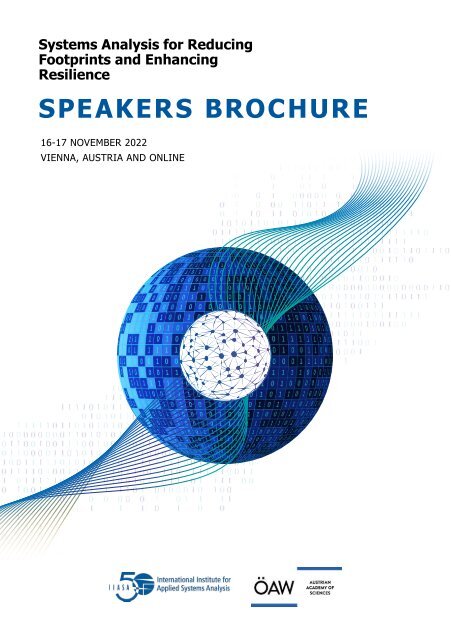

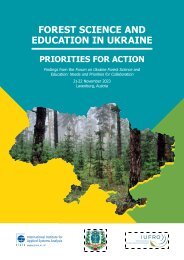
![IIASA BROCHURE_210x594[FINAL] WEB](https://documents.yumpu.com/000/068/591/122/1d4a7749a60d45b83ea15d6d660d0c8b3babc996/30524b562f4966364c7772585a337a5a4b454a3652513d3d/763264657868393835667437685130682f76554f79513d3d.jpg?AWSAccessKeyId=AKIAICNEWSPSEKTJ5M3Q&Expires=1714197600&Signature=lxkCEJh2zAqj3Cs%2B4pps04IacAU%3D)
